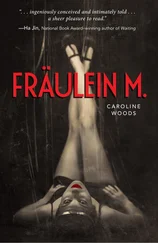That morning, alone in the house for the first time in she didn’t know how long, she opened the refrigerator. It smelled terrible. Casseroles wrapped in aluminum foil or plastic were shoved in every which way, behind which she and her mother had let fruit and vegetables molder, a carton of milk turn lumpy. A hastily wrapped block of Cheddar bore green spores. Science experiments, her father would have called them.
At the back of the top shelf, Janeen saw why her mother couldn’t bring herself to throw out the spoiled food. There was the final pie her father had baked, peach crumb. Late at night, after they’d come back from the hospital, her mother had been taking tiny bites directly from the dish with a fork. Now white fuzz dotted its surface.
Janeen stared at the glass dish for a while. Her father’s last pie. His blunt fingertips had crimped the edges of the crust. He’d softened the peach cubes in butter and brown sugar. Come fall, the apples on her father’s favorite scruffy tree would rot on their branches. Come Thanksgiving, there would be no bourbon crème, no chocolate pluff mud pie. A vision flashed past: Janeen and her mother parked glumly in front of a Christmas special, freezer meals on their laps. Silence between them. For a minute, she couldn’t move.
And then she could. She yanked the dish from the fridge, took it to the garbage can, and shook it until the pie went splat across the top of the trash. The underside of the crust looked naked and exposed, shattered into a dozen pieces. She put her wrist to her forehead, breathing hard. Anita had never been sentimental or delicate, but she should have known Janeen wouldn’t want to do this by herself.
Anita’s own father had passed away when she was a girl. Shouldn’t she have understood? All she would say about it was that she’d lost her parents at a very young age—too young to remember, she said. Too young to grieve?
• • •
For a while that afternoon, Janeen lay on her stomach in the spare bedroom, which would have been her sibling’s if her parents had another child. Instead it hosted their record player and her father’s rarely used banjo.
Lately, she’d been dying for a sibling.
Their house was a ranch, the windows low enough for her to watch blue-black birds nip insects off the tops of the grass. Through the screens she could smell pine resin and, from the salty flats of the Lowcountry, a hint of brine. The grass needed a trim, the tops of scattered blades turning to seed.
Tending to the yard had always been her mother’s job. She was the only woman in the neighborhood who could operate a lawnmower, which she did with vigor as she chain-smoked. As a kid, Janeen had sometimes wished her parents would fit in better, that they’d act like normal people. Like squares. Most people’s parents were squares, even though they tended to be ten years younger than hers. Remy and Anita had gone to outdoor concerts and sat on blankets holding hands. On more than one occasion they’d come back smelling of pot. Her father baked. Her mother was a librarian’s assistant who tinkered with their cars in her spare time. When they danced together at weddings, they’d always joked that she liked to take the lead.
People in Pine Shoals always assumed her mother was a war bride, but her parents had met in a bakery in Atlanta right after the war. Her mother had just been let go from a munitions factory, and her father, back from France, had taken the morning shift at a bakery.
Every day at five o’clock in the morning, before anyone else arrived, her mother would be waiting outside the door. Face gaunt, her hair chopped at uneven angles, she’d mumble her order: apple streusel and a coffee. After weeks of watching her stare out the window and take long bites of cake, Remy sat down at her table, and immediately she moved to put on her jacket.
“Must leave,” she told him abruptly. “I must go.”
At first, Remy had found her rude. And when he heard the accent, the one they’d mocked and cursed on the battlefield, he’d almost left her alone. But then he noticed how her long-boned hands—the nails painted red, but shredded, chipped—shook on the Formica, her cup rattling against its white saucer. “Just let me finish my coffee,” he said. “We don’t have to talk.”
At this, she seemed to relax. After a while she cleared her throat. “From where I came . . .” she began, and he flinched again at the accent, “people have cup of coffee and cake in afternoon, then, walk. You will walk with me, in the park?” She smiled, her teeth crooked and gapped, and he realized then how lonely she was.
That first day, she taught him a word in German: Waldeinsamkeit , the sensation of being alone and content in the woods. “But you aren’t alone,” he protested as they strolled through Piedmont Park, a few blocks from traffic. “I’m spoiling it.” And she smiled at him and told him it was sometimes possible to be alone together.
As a young child, Janeen would request this bit of family lore at bedtime, brushing aside Cinderella or Sleeping Beauty in favor of her parents’ romance. But as she grew, questions surfaced. Why had her mother been so sad? Why did she work in a factory? Where did she go before Atlanta?
Her father’s answers were short: because she missed the people she had to leave in Germany; because she wanted to help America win the war; New York City. Ask your mother, he’d say when Janeen pressed for details. But her mother never told the story.
Lying on the floor of the spare room, Janeen tried reading a dime-store mystery for a while to take her mind off her parents. The words blurred on the page. Finally, at two, she plunged into the heat to get the mail. The envelopes scorched her hands a little, like cookies from the oven. She leafed through catalogs and bills; at the back of the stack was a letter addressed to Anita Moore. There was no return address, but the stamp had been canceled in Manhattan.
Something about it sent a shiver down her arms. She took the envelope up to the music room, where her record still droned, two male voices harmonizing sweetly. She sat on the round rug, staring at the envelope.
It was the handwriting, she realized after a minute, and the goose bumps spread to her scalp. It looked exactly like her mother’s. It was as if she’d sent a letter to herself.
She hesitated for another second, then turned it over and ripped open the flap. The letter was written in German. She nearly folded it and put it back into the envelope, but she could make out the first line, and the second—what else were all her years of German class for?—and before she knew it, she’d read the whole thing.
Dear Anita,
It is only fair that I begin with an introduction. Though I go by Margaret now and use my ex-husband’s last name—Forsyth—I am the girl you knew as Grete Metzger. Berni’s sister. I will understand if you stop here and throw this letter away.
By now you will have heard the news about Henry Klein, the one they are saying is Klaus Eisler. His resurfacing will no doubt have taken you back to the past. In remembering the Eislers, you perhaps have remembered me. This is why I felt I must write. For far too long I have let Klaus and his actions speak for me. It is time I speak for myself.
I write to beg forgiveness. It’s too little, too late, I know, but since I cannot tell Berni—and many others—that I am sorry for what I’ve done, I will tell you.
Every day I’m consumed with regret. I consider small decisions, small mistakes. When I stayed at St. Luisa’s instead of climbing into Sonje’s car. When I shouted you out of the Eislers’ courtyard instead of accepting your apology. When I found your address I faced another decision. Would I write to Anita and explain, burden her with my apology, or remain silent? Would I ask what happened to Berni or stay forever in the dark? I know it is no good to open old wounds, but I choose to ask.
Читать дальше












